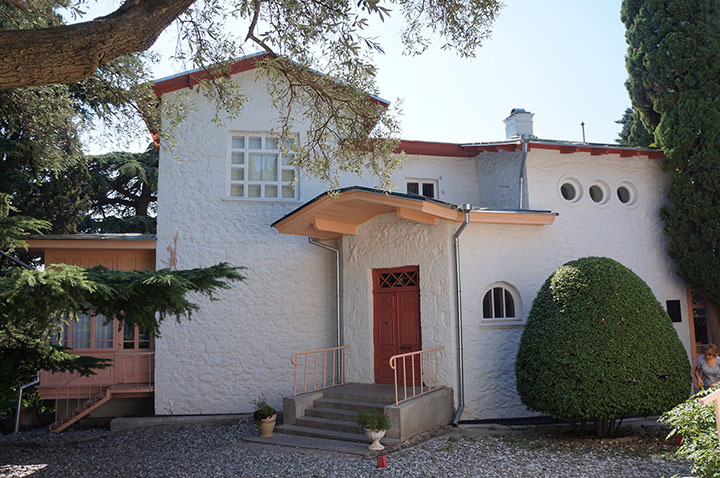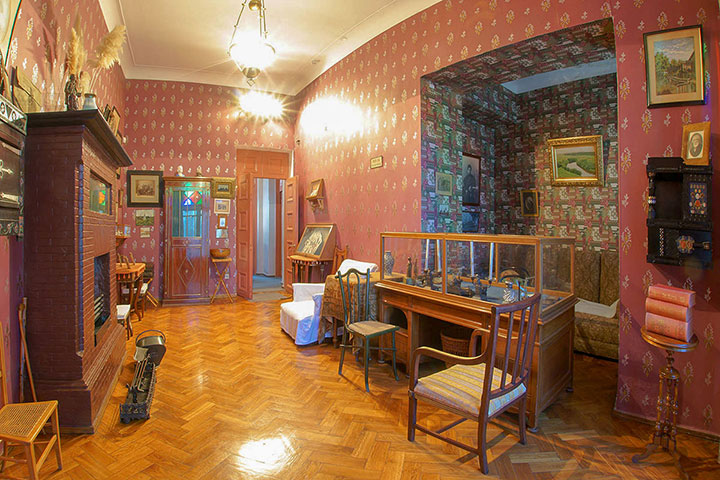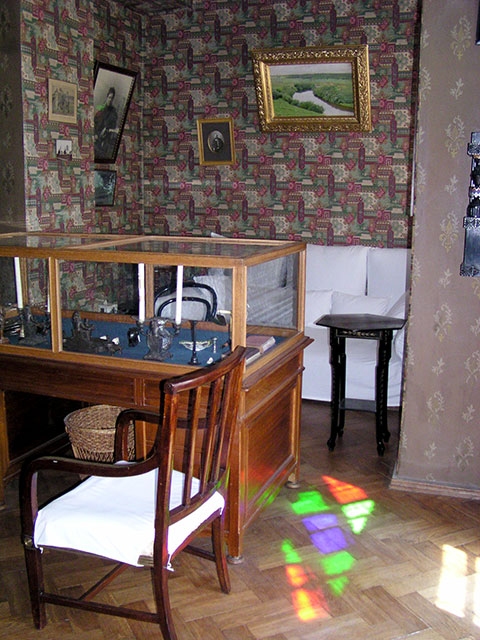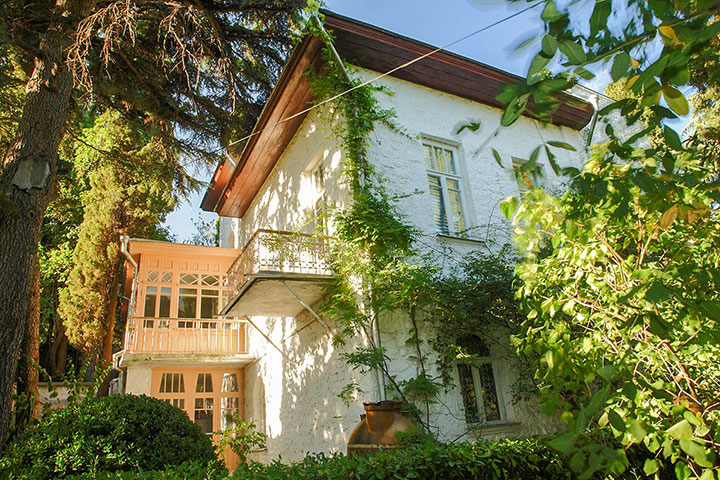A. P. Chekhov house-museum in Yalta

The name of A. P. Chekhov, the humanist-writer, “incomparable artist of life” is close and dear to people His creative work has entered the thesaurus of Russian and world culture as one of the most brilliant pages. Chekhov was a teacher for Maxim Gorky and Alexandei Kuprin, Ivan Bunin and Sergei Sergeyev-Tsensky, Leonid Leonov and Konstantin Fedin. He exerted great influence upon Ernest Hemmingway and Erskine Caldwell, John Galsworthy and Bernard Shaw. His works are being edited in the countries of Europe, Asia, America, Africa. Chekhov's plays are being staged with invariable success at many theatres of the world what confirms the words of Bernard Shaw: “In the galaxy of the great European writers… Chekhov shines like a star of the first magnitude”.
In Chekhov's works a horrid world of oppression, despotism and misery rises before the reader. The apparent calm of Chekhov's lines hide the writer's ardent hatred for banality, coarseness, humiliation of man. Exposing with a sense of bitterness backward, miserable Russia of the past, Chekhov believed in the happy future of his country, prepared people for a better life, just and reasonable.
The writer's house in Yalta where he spent the last years of his life (1899–1904) attracts people like a magic magnet. His mother Evgenia Yakovlevna and sister Maria Pavlovna lived here together with him. The writer's wife, the well-known actress of the Moscow Art Theatre Olga Knipper-Chekhova used to come here when she was free from work at the theatre.

A. P. Chekhov's house completed in 1899 was called by the residents of Yalta the “White Cottage”. Alexander Kuprin wrote in his reminiscences: “Chekhov's cottage in Yalta stood almost outside the town. It was, probably, the most singular building in these places. White all over, neat and light, beautifully asymmetrical, built free of any definite architectural style, with a tower-shaped attic, surprising projections, with a glazed verandah below and an open-air terrace on the top, with irregularly arranged windows, now wide now narrow, it could have been a model of modernist style if it were not for someone's attentive and original thought, someone's peculiar taste its design is marked by”.
In this house Chekhov wrote the narrative “In the Gully”, the plays “The Three Sisters” and “The Cherry Orchard”, the short stories “The Lady with the Dog”, “At Christmas”, “The Bride” and others. At different times M. Gorky, I. Bunin, A. Kuprin dwelled here as guests, the house saw other visitors as well, the outstanding figures of Russian culture: the writers V. Korolenko, D. Mamin-Sibiryak, N. Teleshov, N. Garin-Mikhailovsky, the painters I. Levitan, V. Vasnetsov, G. Yartsev, composers A. Spendiarov, S. Rakhmaninov. The great Chalyapin sang to the accompaniment of Chekhov's piano. In the spring of 1900, this house rang with the voices of the Moscow Art Theatre actors who came to Yalta to show the writer his plays “The Sea Gull” and “Uncle Vanya”.

Chekhov's house has nine rooms. The writer's study and bedroom were on the first floor along with the room of his mother and drawing room. The ground floor was usually occupied by guests and relatives, here also was the room of Olga Knipper-Chekhova. Maria Pavlovna Chekhova, the writer's sister, the founder of the museum and its permanent custodian and director lived for 58 years in the attic on the second floor. Through her efforts everything in the house has been preserved as it was in Anton Pavlovich's lifetime.
A. P. Chekhov lived in Yalta for more than five years. He was then seriously ill. Pulmonary tuberculosis progressed. However, despite his illness he took an active part in public life, as a doctor he never denied aid to anybody. A lot was done by him to alleviate ТВ patients' fate coming here. Together with other progressive people of Russia he collected means for the first accessible to common people, sanatorium “Yauzlar”. Today it is a first-rate establishment for treating ТВ patients outfitted with the up-to-date medical equipment. It has been named after A. P. Chekhov.
The visitors to the museum see a nice garden planted by the writer himself. Here grow evergreen cedars, cypresses, palms, magnolias and fruit trees: peaches, cherries, plums, pears. New trees are being planted instead of dying ones. Rustling overhead is the foliage of the birch trees planted on the 100th anniversary of Anton Pavlovich's birth, in hign bloom are roses, hyacinths, tulips that he loved so much…

In one of the garden's corners stands a bench on which Chekhov used to sit engaged in long talks with Maxim Gorky. Perhaps, precisely here did Anton Pavlovich say to Gorky: “If every man has done on a piece of land all he could, how beautiful our earth would have been!”
Next-door to Chekhov's homestead is a building constructed twenty years ago. It houses literary exposition, museum funds, there are also rooms for scientific workers along with a library. The literary exposition reflects the life and creative work of the great Russian writer. In two halls on display are photographs, documents, A. P. Chekhov's personal belongings, playbills, stills of the films based on his works.
The exposition is concluded by the collections of Chekhov's works edited in the Soviet Union and abroad His books have been published in 44 countries of the world. The writer has exerted great influence upon the development of the artistic culture of the 20th century.
People from different parts of the world come to Yalta and visit the house where everything is warmed by A. P. Chekhov's soul. The innumerable entries in the visitors' book confirm the words said about the writer by his great contemporary Lev Tolstoy: “Chekhov was an incomparable artist… artist of life… and the merit of his creative work is that it is understandable and close to not only every Russian, but to every man in general”.